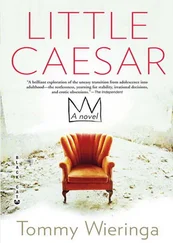‘Hotchachaandoolalabathingbeautywithoutabra!’ Monsef Abdel Aziz shouted after them, knowing full well that he had lost the battle for their attention.
The women had almost reached Mahfouz’s shop. Stroking his moustache in one fluid motion with the back of his index finger, he said with his most winning smile, ‘Welcome, welcome. .’
The women had run his clothing through their hands, each of them had tried on a few rings bearing semiprecious gems and bought a few postcards. Then they walked on. But anyone travelling down the road in a southerly direction had to pass back that way again. When they reached the end of the shopping street the women turned, the woman with the shadow walking on the inside now. Mahfouz ran into his shop, grabbed a souvenir and flew back outside, where he was just in time to hand his present to the woman with ash-blond hair. She took it, confused, not knowing whether it was a present or whether he wanted money for it, and tried to give it back.
‘It’s a gift, for you,’ Mahfouz said.
It was a little model boat, a felucca with an alabaster hull and a sail with the Eye of Horus painted on it in blue and gold. The woman thanked him awkwardly and walked on.
Nuweiba was little more than a hamlet. It was certain that Mahfouz Husseini and Regina Ratzinger would meet again.
The next day they saw each other beside the swimming pool at the Hotel Domina. He had delivered a box of leather wallets to the hotel’s souvenir shop and was about to walk back down the beach to Tarabin when he saw her.
‘Ah, the beautiful lady,’ he said, bowing his head slightly.
‘Wait,’ she said. ‘I wanted to. . a little something. . for that lovely present.’
She went back to her recliner at the poolside, wrapped a sarong around her body and tied it with a knot between her breasts, bent over and took a couple of Egyptian pounds from her bag. She walked back to the man and said, ‘Here, for you.’
Mahfouz shook his head and smiled sadly.
‘I understand,’ he said. ‘You don’t want my gift. I am sorry.’
‘Of course I want it, but. .’
But it was too late: the Egyptian raised his hand briefly to cover his heart, took two steps back and was gone.
Later that afternoon she took a taxi to his shop to apologize. He agreed to meet her that evening for a meal.
‘Oh,’ she said as she left the shop, ‘my name is Regina Ratzinger. What’s yours?’
‘Call me Mahfouz.’
They had fish on the beach in Tarabin. A Sudanese man, his skin black as ink, sat smoking in the shadow of a fishing boat; wagtails were hopping on the sand. The evening sky wrapped itself around them like the lightest of woven fabrics. A Bedouin came by leading a camel by a rope. The Bedouin tried to interest her in a ride along the beach; Mahfouz said something and the Bedouin left. After dinner they walked along the water to the Temple Disco at Hotel Domina. Regina danced with her eyes closed; around them the other members of her tour group swayed tipsily.
Later, back on the beach, Mahfouz built a little fire. He pulled a pack of Cleopatras from his shirt pocket and stuck a cigarette between his lips. His hands went to his pockets but found no lighter. Regina took a burning stick from the fire and held it up to him with shaking hands. He touched the tip of the cigarette to the wood and drew fire into it. Neither of them noticed the glowing ember that fell on Mahfouz’s Terlenka trousers. When the material began to smoke and he leapt up with a shriek to slap out the fire, Mahfouz realized that something had changed for all time.
Look,’ Joe said, ‘Mrs Eilander.’
The Peugeot station wagon belonging to P.J.’s mother was racing along the dyke in our direction. She was kicking up a lot of wind and we watched her go by in a flash, looking grim. She didn’t even respond when Joe and I raised our hands in greeting.
‘Pissed off,’ Joe said.
We had seen her car parked at the police station manned by Sergeant Eus Manting. Why she was there was not hard to guess: she was complaining about a strange airplane that sometimes flew frighteningly low over her garden; Joe had recently started carrying out reconnaissance missions over the White House.
Joe climbed down the dyke, into the washlands, with the words ‘Need to think a bit, Frankie.’ The little clouds of smoke rising up above the sea of stalks and overgrown poppies told me where he was lying. Swallows swooped over him, and insects went whining low across the land in the face of an approaching low-pressure zone.
Flagpoles with book bags on them had been hung out in front of some of the houses in the village. One more year and it would be our turn. And then? Then they would go — Joe, Christof and Engel — to some other place. To study or to work, in any case to do something that didn’t require me. I had, it seemed, become a deeply embedded anchor that would always remain in place. My horizon was blank and I tried not to desire much, like an animal or a Buddhist.
Or like Joe.
I saw Christof on his bike, cycling toward me like a madman.
‘Seen Joe?’ he asked as he pulled up.
I pointed to the field, where the little rings of smoke he produced faded into nothingness as soon as they rose above the grass. Christof leaned his bike against a post and took the barbed wire along the dyke road gingerly between thumb and forefinger. He pushed it down carefully and stepped over, first his right leg, then the left. As he walked down the slope he shouted, ‘Joe! Hey, Joe!’
A hand stuck up out of the grass.
Christof waded over to him and was soon up to his thighs in green, as though sinking slowly. A gust of wind rolled through the grass, behind me the dry leaves rustled as they blew across the road. Not so long ago they had skated down below us there and made an airplane take off, now you could occasionally see an oystercatcher disappear into the breathing sea of grass and flowers, above which swallows performed their daredevil dives. After a while Joe sat up, a little irritated maybe at being disturbed while he was thinking. He got up and walked in my direction. Christof had no more business staying down there, and followed him.
‘So what did you see, Joe?!’ he shouted. ‘Don’t be such an asshole, man, I have a right to know, I helped too, remember. .’
Joe held down the barbed wire to let Christof step over. ‘I saw her,’ he then said slowly.
Christof almost exploded.
‘And what was she doing?’
He seemed to think that nudists did something, some kind of sexual rite or something.
‘There was nothing to see,’ Joe said. ‘There was hair all over it.’
It was like someone had turned down all the sound in the world without saying anything, that’s how quiet it was. You could see Joe thinking. I was disappointed by the announcement; I couldn’t imagine much of anything specific with all that hair, but the effort taken seemed way beyond the results achieved. I had been expecting more.
‘God damn it,’ Christof said. ‘I figured as much.’
Another long vacation was on its way. One of those that slowly melts you away and leaves you to baste in your own juices. The summer holidays were always a bad time for me. There wasn’t a whole lot to do if you weren’t messing around with mopeds and pimply girls. It’s true, I spent my summers in the short trousers and the loud Hawaiian shirts Ma bought for me, but that only drew even more attention. I would rather have bundled myself all up and pulled the gray leatherette plaid up around my neck, but in the summertime that gave me a terrible rash. So instead I sat there like a bump on a log and people looked at me like I was an imbecile. That’s the first thing they think, of course, when they see someone in a wheelchair, that he’s not playing with a full deck. I stopped trying to prove the contrary long ago.
Читать дальше












